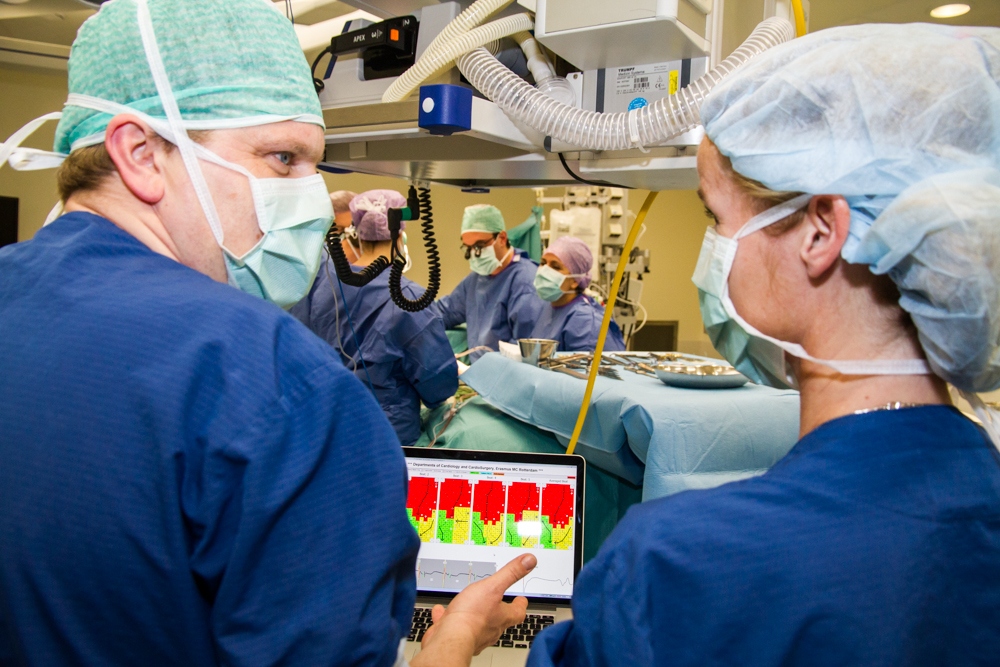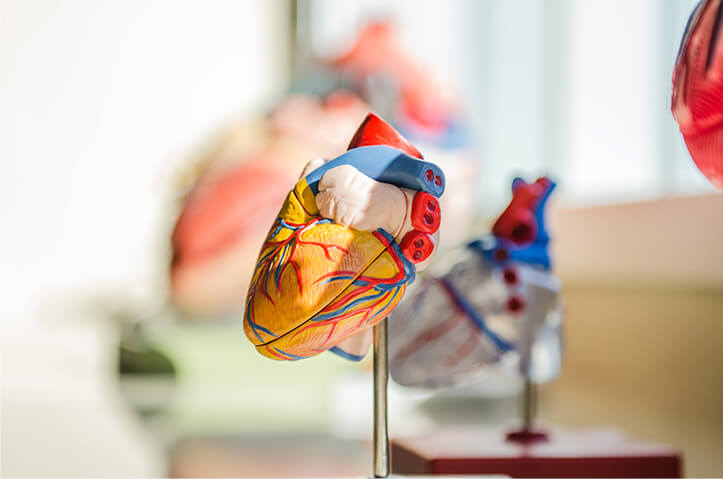
Atrial fibrillation and Diet
Last update: January 18, 2024
Can Changes in Your Diet Help Prevent Atrial Fibrillation?
Various scientific studies indicate that proper nutrition can help in reducing key risk factors for atrial fibrillation. These risk factors include:
- Hypertension (elevated blood pressure)
- Diabetes
- Disturbed lipid profile (HDL, LDL, cholesterol, and triglyceride)
Reducing these risk factors can contribute to preventing cardiac arrhythmias considerably.
This is what we know so far about diet and risk factors for Afib:
- (Processed) red meat increases blood pressure.
- Mediterranean diet reduces atrial fibrillation.
- Unprocessed plant-based food reduces all risk factors for atrial fibrillation.
- Alcohol consumption increases the risk of atrial fibrillation.
- Caffeine has no direct effect on atrial fibrillation but may serve as a trigger.
What is the relationship between (processed) red meat and heart diseases?
While processed red meat raises blood pressure more than unprocessed red meat, several studies show that both types have adverse effects. Processed red meat significantly impacts blood pressure more than unprocessed red meat as it undergoes processing before sale, influencing taste or shelf life.
Meat processing involves:
- Smoking
- Salting (more than unprocessed meat)
- Adding preservatives
Examples of processed meats to avoid include salami, sausages, ham, packaged burgers, pâté, and marinated meat products.
How significant is the effect of red meat on blood pressure?
A comprehensive comparative study reveals that consuming 100 grams of unprocessed meat (per day) is associated with a 14% higher risk of hypertension. For processed meat, every additional 50 grams (per day) increases the risk of hypertension by 12%. It is crucial to note that, according to the review, with each additional portion of meat intake (100 grams unprocessed or 50 grams processed meat), the risk of hypertension further increases.
Moreover, the effect seems more pronounced in women. Women consuming 5 grams of processed red meat five times a week have a 17% higher chance of hypertension compared to those consuming 5 grams once a week.
On the flip side, individuals replacing red meat with white meat, fish, or plant-based foods experienced a 5.2% reduction in blood pressure within 30 days. A similar effect was observed in another study, where individuals with hypertension transitioning to a vegan diet showed a blood pressure reduction (-9 mmHg systolic pressure and -5 mmHg diastolic pressure). Remarkably, 77% of these participants even were able to cease their antihypertensive medication.
Do you enjoy processed and/or unprocessed red meat and have hypertension? In consultation with your doctor or general practitioner, consider switching to a diet based on white meat, fish, or no meat for a month.
Examples of processed meats to avoid include salami, sausages, ham, packaged burgers, pâté, and marinated meat products.
Mediterranean diet helps to combat afib
A Mediterranean diet emphasizes:
- Fresh products
- Whole-grain products
- Olive oil
- Nuts and seeds
- Abundance of vegetables and fruits
- Moderate consumption of meat, fish, and seafood
Additionally, the diet includes:
- Antioxidant vitamins (β carotene, vitamin C, vitamin E)
- Long-chain omega-3 polyunsaturated fatty acids (PUFA)
At the same time, processed meat and highly processed foods are rarely part of the dietary pattern. Additionally, the Mediterranean diet is associated with improved life expectancy and reduced cardiovascular diseases.
The most studied diet components are fish, omega-3/PUFA, and olive oil. A study with 6,705 participants demonstrated that the use of extra virgin olive oil is associated with a lower risk of developing atrial fibrillation. However, the effects of fish and omega-3/PUFA on preventing atrial fibrillation are conflicting.
A ‘Whole Foods Plant-Based’ diet reduces atrial fibrillation risk factors
A ‘whole foods plant-based diet’ consists of unprocessed and plant-based foods. An increasing number of studies are publishing the effects of unprocessed plant-based foods on cardiovascular diseases.
What foods are included in a whole foods plant-based diet? The dietary pattern is rich in:
- Unsweetened beverages
- Vegetables and fruits
- Legumes
- Starchy vegetables (such as sweet potatoes)
- (Whole grain) cereal products
- Fat-rich foods such as nuts, seeds, and kernels
Animal products and processed plant-based products not falling under the ‘whole foods plant-based’ category are:
- Meat
- Poultry
- Fish, shellfish
- Dairy
- Eggs
- Honey
- Refined sugar
- Oil
What are the Effects of a Whole Foods Plant-based Diet on Atrial Fibrillation Risk Factors?
A plant based diet reduces AFib risk factors by:
- Reducing the risk of hypertension (Study 1, Study 2, and Study 3)
- Mitigating the effects of diabetes (Study 1 and Study 2)
- Reducing weight and obesity (Study 1, Study 2, and Study 3)
- Improving systemic inflammatory conditions like rheumatoid arthritis (Study 1)
- Reducing coronary artery diseases like atherosclerosis (Study 1)
Different studies emphasize the positive effect of a whole foods plant-based diet on preventing and reducing risk factors for atrial fibrillation. Whether this diet can directly reduce atrial fibrillation is still unknown.
Alcohol intake may trigger afib
“After one beer or a glass of wine, I have an atrial fibrillation flare-up.” Does this statement resonate with you? Several people with atrial fibrillation report developing this arrhythmia due to moderate to heavy alcohol consumption.
What is known about the level of alcohol intake and afib?
Various quantities in studies have led to the development of atrial fibrillation:
- 2 or more glasses of alcoholic beverages per day (study with 34,715 women)
- Binge drinking (women >4 glasses and men >5 glasses per day) (study with 30,433 adults)
- >21 glasses per week (12 grams of alcohol per glass) (study with 79,019 adults)
- 4 to 5 glasses per day (12 grams of alcohol per glass) (study with 79,019 adults)
Study results show that alcohol intake increases the likelihood of developing atrial fibrillation.
References
- Groh, C. A., Faulkner, M., Getabecha, S., Taffe, V., Nah, G., Sigona, K., McCall, D., Hills, M. T., Sciarappa, K., Pletcher, M. J., Olgin, J. E., & Marcus, G. M. (2019). Patient-reported triggers of paroxysmal atrial fibrillation. Heart rhythm, 16(7), 996–1002. https://doi.org/10.1016/j.hrthm.2019.01.027
- Schwingshackl, L., Schwedhelm, C., Hoffmann, G., Knüppel, S., Iqbal, K., Andriolo, V., Bechthold, A., Schlesinger, S., & Boeing, H. (2017). Food Groups and Risk of Hypertension: A Systematic Review and Dose-Response Meta-Analysis of Prospective Studies. Advances in nutrition (Bethesda, Md.), 8(6), 793–803. https://doi.org/10.3945/an.117.017178
- The American Journal of Clinical Nutrition. Contents. Volume 118, Issue 6. 2023. Pages ii-iii. ISSN 0002-9165. https://doi.org/10.1016/S0002-9165(23)66248-3.
- Kent, L., Morton, D., Rankin, P., Mitchell, B. G., Chang, E., & Diehl, H. A. (2014). Gender differences in effectiveness of the complete health improvement program (chip) lifestyle intervention: an australasian study. Health Promotion Journal of Australia, 25(3), 222-229. https://doi.org/10.1071/he14041
- Lindahl, O., Lindwall, L., Spångberg, A., Stenram, Å., & Öckerman, P. (1984). A vegan regimen with reduced medication in the treatment of hypertension. British Journal of Nutrition, 52(1), 11-20. https://doi.org/10.1079/bjn198 66
- Piepoli, M. F., Hoes, A. W., Agewall, S., Albus, C., Brotons, C., Catapano, A. L., … & Verschuren, W. M. M. (2016). 2016 european guidelines on cardiovascular disease prevention in clinical practice. European Heart Journal, 37(29), 2315-2381. https://doi.org/10.1093/eurheartj/ehw106
- Martínez‐González, M. Á., Arós, F., Fiol, M., Corella, D., Salas‐Salvadó, J., Ros, E., … & Alonso, Á. (2014). Extravirgin olive oil consumption reduces risk of atrial fibrillation. Circulation, 130(1), 18-26. https://doi.org/10.1161/circulationaha.113.006921
- Biccirè, F. G., Bucci, T., Menichelli, D., Cammisotto, V., Pignatelli, P., Carnevale, R., & Pastori, D. (2022). Mediterranean Diet: A Tool to Break the Relationship of Atrial Fibrillation with the Metabolic Syndrome and Non-Alcoholic Fatty Liver Disease. Nutrients, 14(6), 1260. https://doi.org/10.3390/nu14061260
- Storz, M. A., & Helle, P. (2019). Atrial fibrillation risk factor management with a plant-based diet: A review. Journal of arrhythmia, 35(6), 781–788. https://doi.org/10.1002/joa3.12254
- Alexander, S., Ostfeld, R. J., Allen, K., & Williams, K. A. (2017). A plant-based diet and hypertension. Journal of geriatric cardiology : JGC, 14(5), 327–330. https://doi.org/10.11909/j.issn.1671-5411.2017.05.014
- Yokoyama Y, Nishimura K, Barnard ND, et al. Vegetarian Diets and Blood Pressure: A Meta-analysis. JAMA Intern Med. 2014;174(4):577–587. doi:10.1001/jamainternmed.2013.14547.https://jamanetwork-com.vu-nl.idm.oclc.org/journals/jamainternalmedicine/fullarticle/1832195
- Appleby, P., Davey, G., & Key, T. (2002). Hypertension and blood pressure among meat eaters, fish eaters, vegetarians and vegans in EPIC–Oxford. Public Health Nutrition,5(5),645-654.doi:10.1079/PHN2002332.https://www-cambridge-org.vu-nl.idm.oclc.org/core/journals/public-health-nutrition/article/hypertension-and-blood-pressure-among-meat-eaters-fish-eaters-vegetarians-and-vegans-in-epicoxford/678E54EF633FD623EF778BE1BA743C6A.
- Yokoyama, Y., Barnard, N. D., Levin, S. M., & Watanabe, M. (2014). Vegetarian diets and glycemic control in diabetes: a systematic review and meta-analysis. Cardiovascular diagnosis and therapy, 4(5), 373–382. https://doi.org/10.3978/j.issn.2223-3652.2014.10.04
- Lee, Y. M., Kim, S. A., Lee, I. K., Kim, J. G., Park, K. G., Jeong, J. Y., Jeon, J. H., Shin, J. Y., & Lee, D. H. (2016). Effect of a Brown Rice Based Vegan Diet and Conventional Diabetic Diet on Glycemic Control of Patients with Type 2 Diabetes: A 12-Week Randomized Clinical Trial. PloS one, 11(6), e0155918. https://doi.org/10.1371/journal.pone.0155918
- Barnard, N. D., Levin, S., & Yokoyama, Y. (2015). A systematic review and meta-analysis of changes in body weight in clinical trials of vegetarian diets. Journal of the Academy of Nutrition and Dietetics, 115(6), 954-969. https://doi.org/10.1016/j.jand.2014.11.016
- Tonstad, S., Butler, T., Yan, R., & Fraser, G. E. (2009). Type of vegetarian diet, body weight, and prevalence of type 2 diabetes. Diabetes care, 32(5), 791–796. https://doi.org/10.2337/dc08-1886
- Menzel, J., Jabakhanji, A., Biemann, R., Mai, K., Abraham, K., & Weikert, C. (2020). Systematic review and meta-analysis of the associations of vegan and vegetarian diets with inflammatory biomarkers. Scientific reports, 10(1), 21736. https://doi.org/10.1038/s41598-020-78426-8
- Tuso, P., Stoll, S. R., & Li, W. W. (2015). A plant-based diet, atherogenesis, and coronary artery disease prevention. The Permanente journal, 19(1), 62–67. https://doi.org/10.7812/TPP/14-036
- Conen D, Tedrow UB, Cook NR, Moorthy MV, Buring JE, Albert CM. Alcohol Consumption and Risk of Incident Atrial Fibrillation in Women. JAMA. 2008;300(21):2489–2496.doi:10.1001/jama.2008.755.https://jamanetwork-com.vu-nl.idm.oclc.org/journals/jama/fullarticle/183007
- Liang, Y., Mente, A., Yusuf, S., Gao, P., Sleight, P., Zhu, J., Fagard, R., Lonn, E., Teo, K. K., & ONTARGET and TRANSCEND Investigators (2012). Alcohol consumption and the risk of incident atrial fibrillation among people with cardiovascular disease. CMAJ : Canadian Medical Association journal = journal de l’Association medicale canadienne, 184(16), E857–E866. https://doi.org/10.1503/cmaj.120412
- David Conen, Christine M. Albert. (2014).Journal of the American College of Cardiology. Alcohol Consumption and Risk of Atrial Fibrillation: How Much Is Too Much?. Volume 64, Issue 3, Pages 290-292. ISSN 0735-1097. https://doi.org/10.1016/j.jacc.2014.04.038.
Share this article
















